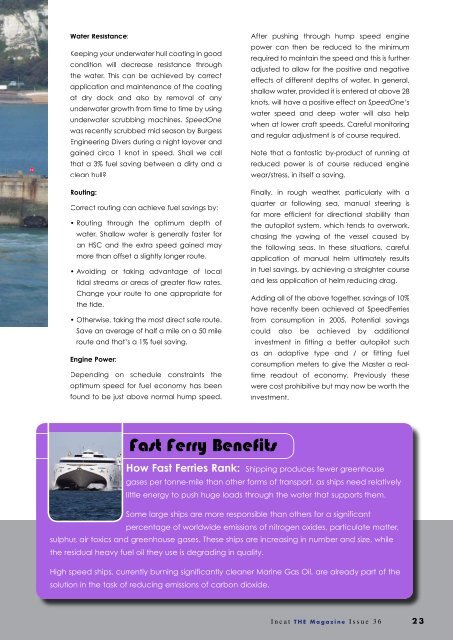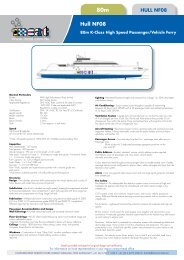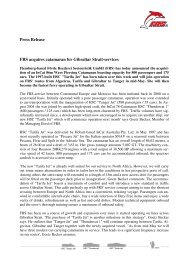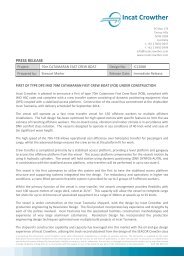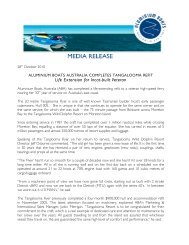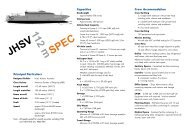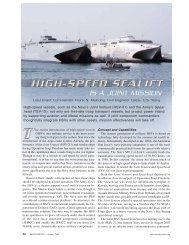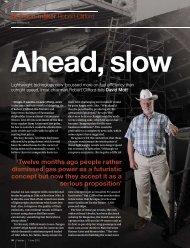US NAVY'S - Incat
US NAVY'S - Incat
US NAVY'S - Incat
You also want an ePaper? Increase the reach of your titles
YUMPU automatically turns print PDFs into web optimized ePapers that Google loves.
Water Resistance:<br />
Keeping your underwater hull coating in good<br />
condition will decrease resistance through<br />
the water. This can be achieved by correct<br />
application and maintenance of the coating<br />
at dry dock and also by removal of any<br />
underwater growth from time to time by using<br />
underwater scrubbing machines. SpeedOne<br />
was recently scrubbed mid season by Burgess<br />
Engineering Divers during a night layover and<br />
gained circa 1 knot in speed. Shall we call<br />
that a 3% fuel saving between a dirty and a<br />
clean hull<br />
Routing:<br />
Correct routing can achieve fuel savings by:<br />
• Routing through the optimum depth of<br />
water. Shallow water is generally faster for<br />
an HSC and the extra speed gained may<br />
more than offset a slightly longer route.<br />
• Avoiding or taking advantage of local<br />
tidal streams or areas of greater flow rates.<br />
Change your route to one appropriate for<br />
the tide.<br />
• Otherwise, taking the most direct safe route.<br />
Save an average of half a mile on a 50 mile<br />
route and that’s a 1% fuel saving.<br />
Engine Power:<br />
Depending on schedule constraints the<br />
optimum speed for fuel economy has been<br />
found to be just above normal hump speed.<br />
After pushing through hump speed engine<br />
power can then be reduced to the minimum<br />
required to maintain the speed and this is further<br />
adjusted to allow for the positive and negative<br />
effects of different depths of water. In general,<br />
shallow water, provided it is entered at above 28<br />
knots, will have a positive effect on SpeedOne’s<br />
water speed and deep water will also help<br />
when at lower craft speeds. Careful monitoring<br />
and regular adjustment is of course required.<br />
Note that a fantastic by-product of running at<br />
reduced power is of course reduced engine<br />
wear/stress, in itself a saving.<br />
Finally, in rough weather, particularly with a<br />
quarter or following sea, manual steering is<br />
far more efficient for directional stability than<br />
the autopilot system, which tends to overwork,<br />
chasing the yawing of the vessel caused by<br />
the following seas. In these situations, careful<br />
application of manual helm ultimately results<br />
in fuel savings, by achieving a straighter course<br />
and less application of helm reducing drag.<br />
Adding all of the above together, savings of 10%<br />
have recently been achieved at SpeedFerries<br />
from consumption in 2005. Potential savings<br />
could also be achieved by additional<br />
investment in fitting a better autopilot such<br />
as an adaptive type and / or fitting fuel<br />
consumption meters to give the Master a realtime<br />
readout of economy. Previously these<br />
were cost prohibitive but may now be worth the<br />
investment.<br />
Fast Ferry Benefits<br />
How Fast Ferries Rank: Shipping produces fewer greenhouse<br />
gases per tonne-mile than other forms of transport, as ships need relatively<br />
little energy to push huge loads through the water that supports them.<br />
Some large ships are more responsible than others for a significant<br />
percentage of worldwide emissions of nitrogen oxides, particulate matter,<br />
sulphur, air toxics and greenhouse gases. These ships are increasing in number and size, while<br />
the residual heavy fuel oil they use is degrading in quality.<br />
High speed ships, currently burning significantly cleaner Marine Gas Oil, are already part of the<br />
solution in the task of reducing emissions of carbon dioxide.<br />
<strong>Incat</strong> THE Magazine Issue 36 23


